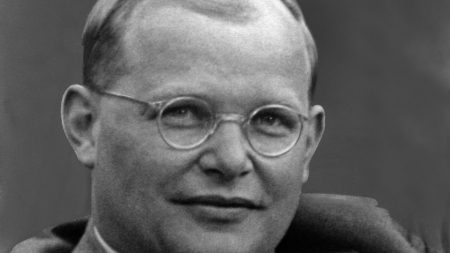Dietrich Bonhoeffer (1906-1945), a Protestant pastor, was one of Germany’s leading scholars of the twentieth century. He courageously returned from Union Seminary in New York to oppose Adolf Hitler. His great desire was for Christians to follow Christ whatever the cost. It was a cost he knew only too well: he was arrested, imprisoned, and executed (just days before the end of the Second World War) for his opposition to the Nazi regime. In his most famous work, The Cost of Discipleship (1937), he urged Christians to throw off everything that hindered their wholehearted allegiance to Christ, including the accumulation of wealth.
Jesus does not forbid the possession of property in itself. He was man, he ate and drank like his disciples, and thereby sanctified the good things of life. These necessities, which are consumed in use and which meet the legitimate requirements of the body, are to be used by the disciple with thankfulness . . . Earthly goods are given to be used, not to be collected. In the wilderness God gave Israel the manna every day, and they had no need to worry about food and drink. Indeed, if they kept any of the manna over until the next day, it went bad. In the same way, the disciple must receive his portion from God every day. If he stores it up as a permanent possession, he spoils not only the gift but himself as well, for he sets his heart on accumulated wealth, and makes it a barrier between himself and God. Where our treasure is, there is our trust, our security, our consolation and our God. Hoarding is idolatry.1
Of course, manna is not the only pertinent biblical analogy. Proverbs 6:6-8 counsels the sluggard to imitate the ant, which “stores its provisions in summer.” And Genesis 41:46-57 presents Joseph as the model of prudence in storing grain for the lean years. Here Bonhoeffer goes on to draw the line between legitimate and illegitimate accumulation.
Our treasure may of course be small and inconspicuous, but its size is immaterial; it all depends on the heart, on ourselves. And if we ask how we are to know where our hearts are, the answer is just as simple—everything which hinders us from loving God above all things and acts as a barrier between ourselves and our obedience to Jesus is our treasure, and the place where our heart is . . .
If our hearts are entirely given to God, it is clear that we cannot serve two masters; it is simply impossible—at any rate all the time we are following Christ. It would of course be tempting to show how far we had advanced in the Christian life by endeavouring to serve two masters and giving each his due, both God and Mammon. Why should we not be happy children of the world just because we are the children of God? After all, do we not rejoice in his good gifts, and do we not receive our treasures as a blessing from him? No, God and the world, God and its goods are incompatible, because the world and its goods make a bid for our hearts, and only when they have won them do they become what they really are. That is how they thrive, and that is why they are incompatible with allegiance to God. Our hearts have room only for one all-embracing devotion, and we can only cleave to one Lord. Every competitor to that devotion must be hated. As Jesus says, there is no alternative—either we love God or we hate him.2
Footnotes:
1 Dietrich Bonhoeffer, The Cost of Discipleship (London: SCM Press Ltd., 1959), 155-156.
2 Ibid., 156-157.





